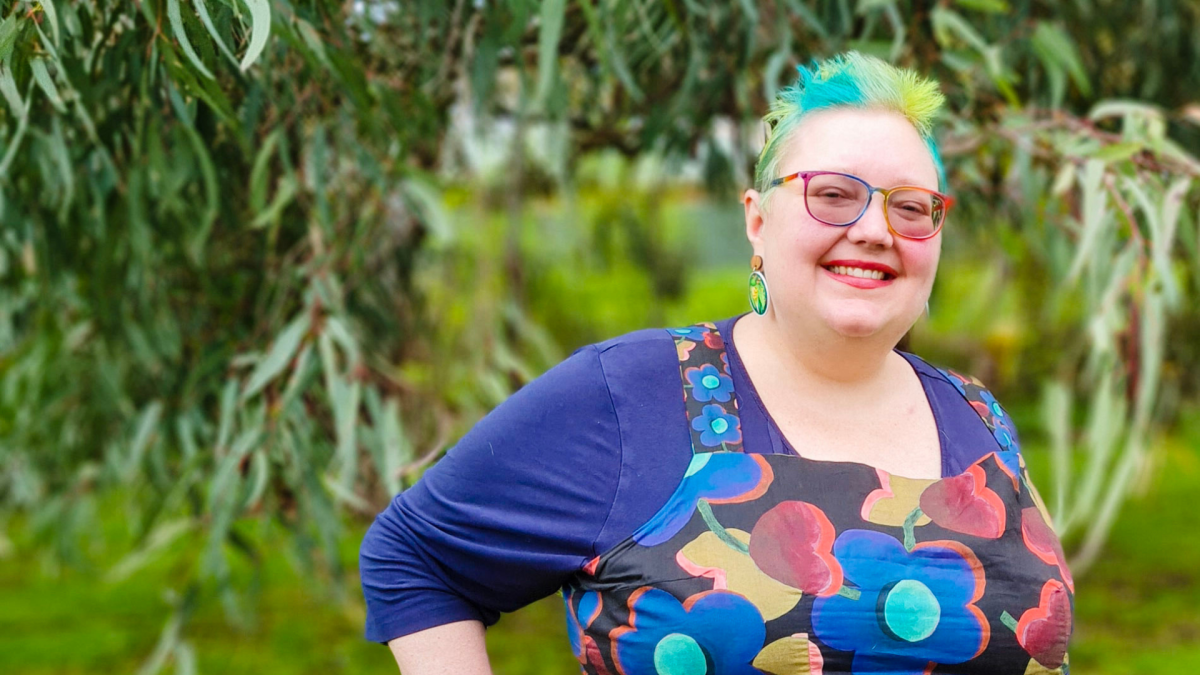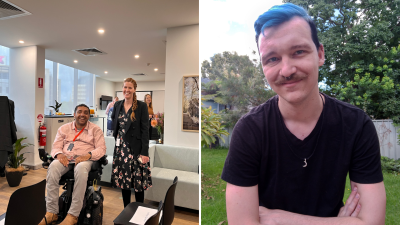Ceara uses her story to educate and advocate for people with disability.

Image: Ceara standing outdoors wearing a long-sleeved purple top under a dress with blue, yellow and red flowers. Ceara has short, colourful hair and rainbow glasses.
Ceara first became disabled not long after starting with Life Without Barriers in 2013.
“I developed an autoimmune condition called immune thrombocytopenia (ITP), a bleeding disorder, which later developed into a rarer condition called Evans Syndrome. Then I developed Metastatic Breast Cancer in 2020 – a terminal illness,” Ceara said.
“Not everyone thinks of chronic illnesses as disabilities, but they are.”
When describing herself, Ceara prefers to use identity-first language.
“I identify as ‘disabled’, not as a ‘person with disability’. I prefer identity-first language because I’ve noticed that person-first language is often used when something is stigmatised. No one calls me a ‘person with psychologist registration’ because they don’t need to remind themselves that psychologists are people! I don’t need a verbal reminder that I’m a human being every time I mention my disability,” she said.
“Living with my disabilities is like being on a rollercoaster. Sometimes my immune issues are in remission, my cancer is stable, and you’d never know I was sick unless I told you. At other times, I find myself critically ill in the hospital facing lengthy rehabilitation periods.
“Through it all, I’ve stayed at Life Without Barriers. I have gone from working as a clinician in mental health to realising I needed to give that work up because, as my health worsened, I could no longer do the intensive outreach work I used to.”
When Ceara required a role change to support her health, Life Without Barriers offered a move into the Centre for Practice Excellence.
“I don’t get the joy of working directly with the people we support anymore. Still, as a Practice Assurance Advisor, I get to use my knowledge and experience to help my colleagues by supporting teams to do the best work they can do,” she said.
Ceara’s disability has led to challenges in every aspect of her life, including work.
“I am immunocompromised, which makes life difficult in a pandemic. I am thrilled that I can work from home, where I can ensure my safety and manage my energy. Unlike most people with disability, I sometimes need quite a bit of sick leave,” she said.
“Last year, I experienced my most severe relapse yet; I became critically ill and spent six months in the hospital! I could relapse tomorrow, or it could be years before I need time off again.”
For Ceara, working for an organisation that actively supports and empowers people with disability is paramount.
“Life Without Barriers isn’t perfect. There is always room for growth in any workplace, but I am proud to work for an organisation that genuinely walks the talk regarding being inclusive of disabled people,” she said.
“It’s not just the willingness to be flexible, allowing me to take leave when I need it, offering me work that can accommodate my disability needs safely, or being able to supplement my disability pension by working. It’s also the attitude and values within the organisation."
“I feel valued and cared for as a person, a professional, and someone with a disability.”
“Contributing through my work to make the world a better place makes an enormous difference in my quality of life. I am incredibly open about my health and disability, at work and outside of work, because I don’t believe in hiding something that affects every facet of my life. I like to use my story to educate and advocate.”
Ceara wants people to know that people with disability have significant contributions to make to the workforce.
“It takes courage and creativity to ride the rollercoaster with me. But in doing so, Life Without Barriers benefits from my deep knowledge, both from my skill as a psychologist and my lived experience of disability.”


